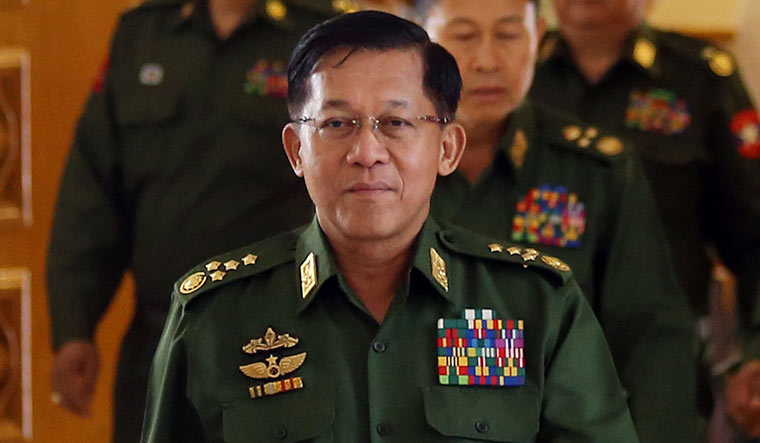THE TANKS RUMBLED along the empty roads of Nay Pyi Taw. The deadline was clear for the Myanmar military: the first session of the new parliament. The November elections had made it clear to its top brass that the ballot, even in its limited form, can be more powerful than the bullet.
Aung San Suu Kyi’s National Democratic League won the elections in a landslide, bagging 396 of 476 seats. As the new government was getting ready to take charge, the army grabbed control. It detained State Counsellor Suu Kyi, President Win Myint and other senior leaders and declared a year-long emergency. “This has been brewing,” said Gautam Mukhopadhaya, former Indian ambassador to Myanmar. “It has been an uneasy cohabitation. The army could not reconcile to the civilian victory and felt it would be marginalised. The timing was forced by the beginning of the new parliament session.”
This is the first coup in the country since 1988. A decade after the junta permitted a limited democratic experiment, although it reserved seats for itself in the parliament and held on to major portfolios, it is back to square one now. The army has shut down television and radio stations and has disabled telephone lines and the internet. Army Chief Min Aung Hlaing justified the coup and said it was in line with the law. “After many requests, this way was inevitable for the country,” said the general.
The Indian response has been guarded. “We have noted the developments in Myanmar with deep concern. India has always been steadfast in its support to the process of democratic transition in Myanmar,” said a statement issued by the ministry of external affairs. “We believe that the rule of law and the democratic process must be upheld. We are monitoring the situation closely.”
The uncertainty in Myanmar poses a big challenge for India, especially at a time when China is trying to assert its might in the neighbourhood. It also brings back the old “dilemma”, as India’s master diplomat, the late J.N. Dixit had put it. Although India prides itself to be the upholder of democracy in the region, it had to reach out to the junta in the past. Dixit, back in 1991, had clarified that India was “supportive of democratic forces”, but was “interacting with the de facto government”.
Myanmar is one of the key pillars of India’s ‘neighbourhood first’ and ‘look east’ policies. India has been pulling out all the stops to woo Myanmar, including sending 15 lakh doses of the Covid-19 vaccine. In November, Foreign Secretary Harsh Vardhan Shringla and Army Chief General M.M. Naravane visited Nay Pyi Taw to discuss “important bilateral issues”.
There has been enhanced security cooperation between the two countries. Myanmar has been more than ready to hand over insurgents, while India has been handling the Rohingya refugee crisis delicately with Bangladesh, in order to protect Myanmar’s interests. In 2019, India allocated Myanmar Rs170 crore in its annual budget. This time, it has gone up to Rs400 crore.
The vaccine diplomacy and the monetary support have come at a time when the generals in Myanmar seem to be slightly disenchanted with China. Last July, Min Aung Hlaing alleged in an interview that terrorist groups in Myanmar were being backed by “strong forces”, in an obvious reference to China. A month before that, Myanmar’s auditor general Maw Than warned that reliance on Chinese loans could force the country to go the Sri Lankan way. “Loans from China come at higher interest rates compared with loans from financial institutions like the World Bank,” he said. “So, I would like to remind the government ministries to be more restrained in using Chinese loans.”
China, however, continues to be a powerful force in Myanmar. “We cannot let China be the only player with the military,’’ said Harsh Pant, who heads the strategic studies programme at the Delhi-based Observer Research Foundation. And the two-track policy with Myanmar will continue. “I don’t think megaphone diplomacy works in the region,” said Mukhopadhaya. “Our commitment to democracy stands. We favour popular rule. It is likely to be behind-the-scenes diplomacy.”
India, however, is likely to face pressure from the Joe Biden administration, which has come to power on the plank of a renewed promise of democracy. The White House would want India to nudge the generals back to the democratic track. The issue could even put some strain on India-US relations in the days to come. Pant said American sanctions were unlikely to work as they have had no impact in the past. “The US will have to think whether it wants China to be the only player [which is friendly with] Myanmar in the region,” he said.
The next few months will be critical, especially with the military clamping down on its challengers and pro-democracy protests beginning to take shape. The fate of democracy hangs in the balance. Suu Kyi, who is back under arrest, has become the symbol of democracy once again despite her anti-Rohingya stand. “She is likely to emerge stronger,” said Mukhopadhaya. “She is steely-willed and will rise to the challenge.”



